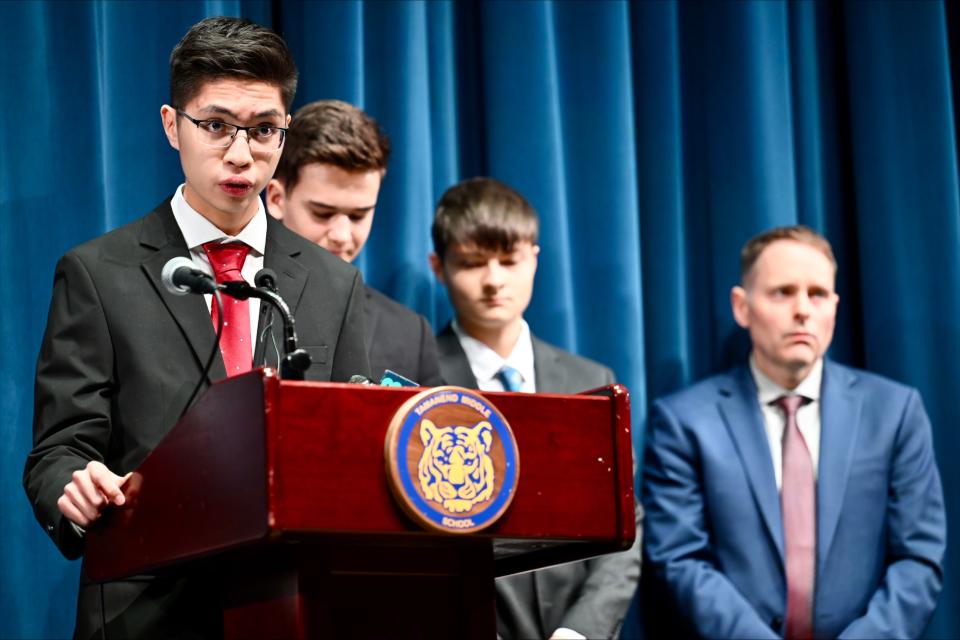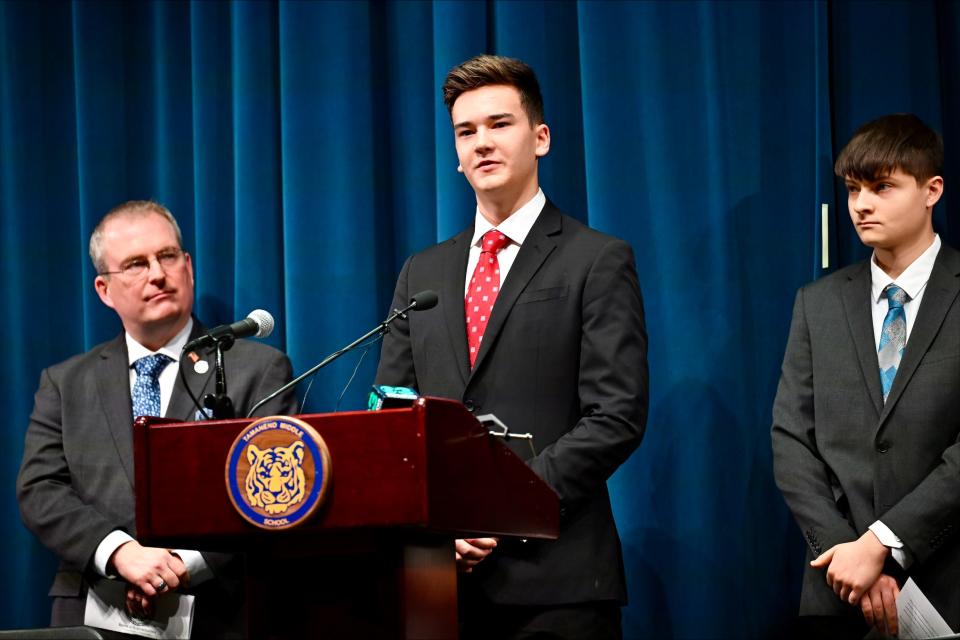Should social media track kids' chats? 3 Central Bucks teens craft PA House Bill
A new bill introduced by a Bucks County lawmaker and drafted with the help of three Central Bucks students could put tighter restrictions on social media companies and make them accountable for online bullying and harassment.
During a press conference Tuesday at Tamanend Middle School, in Warrington, state Rep. Brian Munroe announced a House Bill 2017, “co-authored” by three former Tamanend students, which would require social media companies to monitor chats of two or more minors and notify parents of “flagged sensitive or graphic content,” require parental consent for users under 16 to create social media accounts and restrict data mining on users under 18.
Max Jin, Luka Jonjic and Dylan Schwartz, now Central Bucks High School South sophomores, submitted a nearly seven-minute video in 2023 on the negative mental health impacts of social media on teens to C-SPAN’s StudentCam competition, garnering an Honorable Mention in the contest.

Part of a yearly extracurricular project by history teacher John Heisey, the three teens approached the video as a research on what would be their top legislative priority as newly elected congressmen.
“The video they produced called for legislation on social media, especially due to its impact on youth mental health …. And make no mistake that this was a cry for help for a generation suffering the brunt of social media’s impact, soaring rates of anxiety, self-esteem issues and depression, all while social media companies rake in the profits with minimal accountability,” Munroe said.
While parents do have a responsibility to monitor, Munroe said there’s only so much parents and teens can do to combat harassment and bullying online.
More: Stress, low pay, uncertainty drove these Pa. teachers away from a profession they loved
Munroe recalled an instance a few months ago where he discovered a Snapchat group chat on his daughter’s phone where several members in the group of 30 were “horrifically bullying” another student.
Around the same time, Munroe saw the video proposing a fictional version of the kind of legislation needed to address the kind of problems he witnessed for himself and issued a challenge to the boys, “help me write this bill.”
The three, recognizing a “once-in-a-life-time opportunity,” emphatically agreed.
The problem with social media
Jin, Jonjic and Schwartz decided to tackle social media and mental health because they had first-hand knowledge dealing with its pitfalls and know its an issue that affects almost everyone regardless of age.
“The mental health impact of social media resonated with us the most due to its increasing presence in our daily lives and the relevance it has had in recent years,”said Jin, 15. “Instances of cyber-bullying or improper conduct from another user, along with risks for platforms to promote unhealthy habits or data mining, can all have detrimental impacts on our nation's youth, resulting in symptoms of depression, anxiety, loneliness and changes in sleeping and eating habits amongst many others.”
The Pew Research Center in 2023 found that nearly 95% of teens ages 13 to 17 reported using some social media platform and about 54% would find it hard to give up social media.

A May 2023 advisory by the U.S. Office of the Surgeon General issued an advisory on social media use for teens that found 46% of teens reported feeling worse about their body image after using social media and that 64% of adolescents were “often” or “sometimes” exposed to hate-based content.
More: Only a handful of Pa. school districts have policies protecting trans students
Penny Ettinger, executive director of the NOVA in Bucks County, said at Tuesday’s press conference that the potential risks of social media have been something her group has been monitoring for a long time.
“Two decades ago, we recognized the importance of internet safety education before any of us had an idea of the benefits and dangers that social media would be providing us in our daily lives,” Ettinger said.
Central Bucks was the first school district to request NOVA’s “cyber safety program” that the group began offering about 10 years ago.
In over the last five years alone, NOVA has provided across Bucks County 956 programs serving over 23,000 parents and students covering topics including digital footprints, cyber-bullying and sexting.
“The reality is that children are exposed to dangers like victimization, cyber-bullying at increasingly younger ages, their impact on their mental health and well-being cannot be understated. And it's up to each one of us to act,” Ettinger said.
Establishing tech-free zones at home, educating parents and children on best practices for using social media and supporting bills like the one announced Tuesday are some of the steps Ettinger said were proactive steps to addressing problems in social media.
Quitting social media isn’t an option
It might seem like an easy response to the potential negative consequences of social media is to simply not use social media, but Jin, Jonjic and Schwartz say that’s simply not a realistic approach.
Social media platforms like TikTok, Snapchat and X, formerly Twitter, have become ubiquitous tools of communication for generations of digital natives, people who have grown up using digital devices and the internet.
Jonjic,16, said he feels addicted to social media and it’s not an easy task for him and his peers to just disconnect from a never-ending content stream “that’s always there for them.”
Schwartz and Jin, both 15, said that, despite the negative aspects of social media, those platforms are how teens connect and socialize.
“For example, as students, I'm a part of the Student Council,” Jin said, “a lot of what we do is on Instagram advertising and promoting any causes, fundraisers, events. And that's primarily how students and our peers are going to get that information.”
Schwartz added that he feels society has built itself around social media and that means cutting ties to those platforms means shutting out a lot of peer interaction.
“If you are getting cyber bullied on (social media), it's so hard to let go because you have to take into consideration one person versus my entire social life,” Schwartz said.
More: Why Bucks County school districts are short on school psychologists amid mental health crisis
This article originally appeared on Bucks County Courier Times: PA rep proposes bill to fight social media bullying, harrassment

